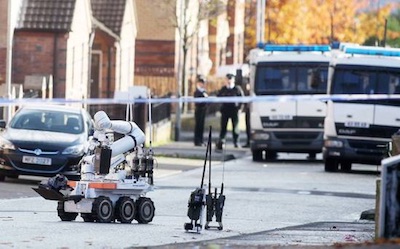
The organisation known as the ‘new IRA’ has claimed that a substantial device failed to explode as two members of a PSNI patrol were in the north Belfast area last week.
The device was hidden in the frame of advertising hoarding outside a bookmakers in Ardoyne. It is believed to be the first time the group has attempted to use remote-controlled technology in an attempt to detonate a bomb.
The breakaway group claimed responsibility for the attack using a recognised codeword, as well as two other bomb attacks in Belfast and Derry last month.
An IRA source told journalists that three attempts were made to detonate the Ardoyne device before the attack was aborted. The source said the bomb location was chosen after the group observed the PSNI patrols near the Twaddell loyalist protest camp, with the device built into the hoarding’s hollow frame.
Earlier attempts to detonate the device were said to have been abandoned due to the presence of civilians in the area, before the attack was eventually called off.
The homemade bomb is one of a number recently developed by the new organisation’s engineering department. In the past the group has used Explosively Formed Projectile (EFP) mortars as well as homemade ‘drop-and-go’ grenade launchers.
Sinn Fein Assembly member Gerry Kelly said those behind the bomb attempt were “deluded” and the actions “futile”.
“They have nothing to offer the people of this community other than trying to plunge us back to the past. The community is not prepared to let them do that,” he said. “They need to stop these futile actions immediately and let people in the area get on with their lives in peace.”
The organisation also claimed responsibility for a blast bomb attack on the PSNI in north Belfast last month. A source described the attack as “spontaneous” and said the device was thrown from ground level after a PSNI patrol travelled into the New Lodge district last month. It is believed the device exploded in mid air, just short of its intended target, in Victoria Parade on April 21.
The IRA has also said it left a second device during an attempted bomb attack in Derry last month. Sources close to the organisation told journalists that an “anti-personnel device on a delayed timer” was left close to the scene of an explosion outside a probation office at Crawford Square in Derry last Monday.
A “viable” device was also defused by a British Army bomb squad in Newry on Thursday. A second device found in the Ardoyne area of north Belfast on the same day was described by the PSNI as “not viable”.
Meanwhile, two viable bombs partially exploded on Sunday night at a British Army base in Derry. The devices were discovered at the barracks of the Territorial Army in the Waterside area. The PSNI said CCTV footage showed that the bombs partially went off at about 11.35pm on Sunday but failed to fully explode.
Sinn Fein’s Raymond McCartney said the alert achieved nothing other than to cause disruption.
“A number of local residents, including elderly members of our community, have had to be evacuated from their homes as a result of this incident. Those responsible need to reflect on the fact that the vast majority of people in this city have moved on and do not want this,” he said.
‘ATTACKS IGNORED’ - SF
Meanwhile, Sinn Fein has condemned the failure of the media to highlight a mysterious series of attacks and threats to its members, just days before the Westminster election.
The cars of Sinn Fein activist Sean McMonagle and two Derry Councillors Sandra Duffy and Colly Kelly were burned, while death threats were reportedly made against party candidates Mickey Brady, Gerry Kelly and Caoimhe Archibald. The home of Deputy First Minister Martin McGuinness was paint bombed, and there were reports of devices at the homes of representatives Martina Anderson and Raymond McCartney in Derry, and at Gerry Adams’ family home in west Belfast.
There was considerable doubt over who might be responsible for the spate of incidents, with political rivals, loyalists, anti-social elements, ‘anti-democratic groups’ and ‘agents provocateurs’ all put in the frame by Sinn Fein activists.
Party leader Gerry Adams said the attacks were clearly linked to the Westminster election with the purpose of intimidating the party. He called on the Dublin government to “take a clear stand against these actions; condemn them; and reject those who would seek to undermine the peace process and the political institutions in the north”.
A leading member of the 32 County Sovereignty Movement, Gary Donnelly, condemned the attacks said he doubted Sinn Fein’s republican opponents were involved.
“Whilst I am not aware of the motivation behind these particular attacks, I want to make it clear that they cannot be justified by any political ideology.”
![[Irish Republican News]](https://republican-news.org/graphics/title_gifs/rn.gif)
![[Irish Republican News]](https://republican-news.org/graphics/title_gifs/harp.gif)

